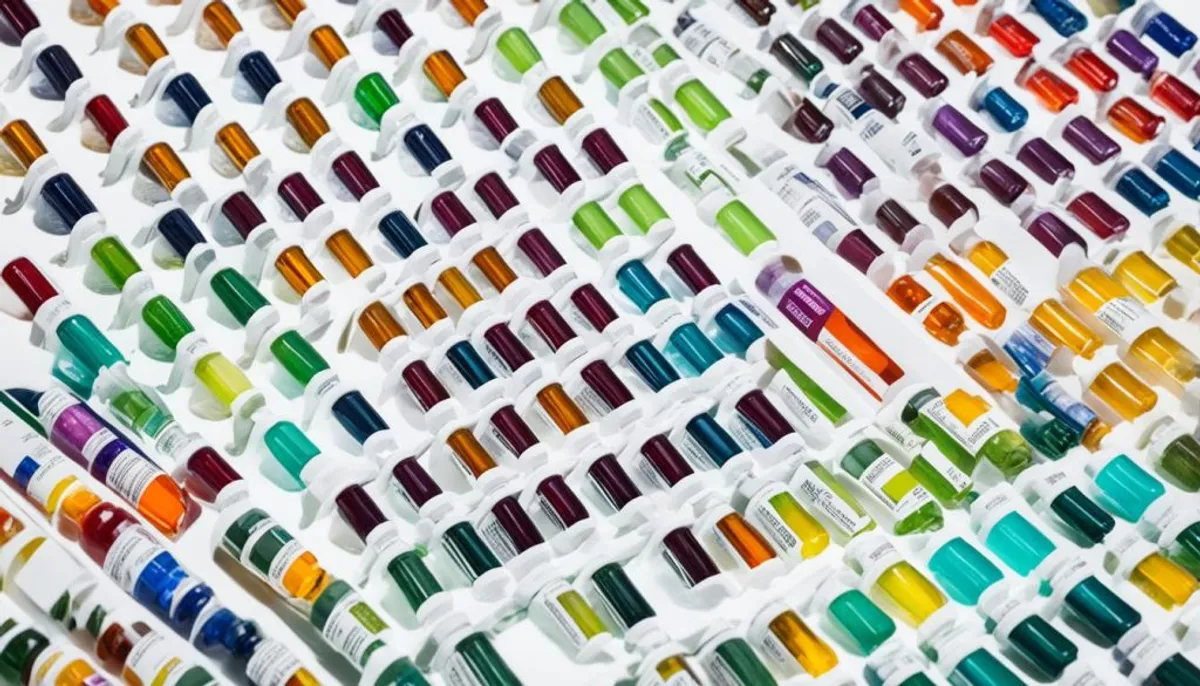Xerostomia, or dry mouth, is a common issue that can really affect your daily life. This guide will cover the best supplements and remedies for xerostomia. You’ll learn about saliva stimulants, oral moisturizers, herbal supplements, and other treatments to help with dry mouth and keep your mouth healthy.

Understanding Xerostomia: Causes and Symptoms
Xerostomia, also known as chronic dry mouth, affects many people. It can really change how you live. Knowing what causes it and spotting the symptoms is key to finding relief.
Common Causes of Dry Mouth
There are several reasons why someone might have xerostomia:
- Certain medications: Some drugs like antidepressants, antihistamines, and blood pressure meds can mess with the salivary glands. This leads to less saliva and a dry mouth.
- Radiation therapy: Treating head and neck cancers with radiation can hurt the salivary glands. This causes dry mouth.
- Sjögren’s syndrome: This disease attacks the glands that make moisture, including the salivary glands. It leads to xerostomia.
- Dehydration: Not drinking enough water or losing too much fluid can make you dehydrated and dry mouthed.
- Salivary gland dysfunction: Age, certain health issues, and some medicines can make the salivary glands work poorly.
Symptoms of Xerostomia
People with xerostomia often notice:
- A constant dry or sticky feeling in the mouth
- Difficulty speaking, chewing, and swallowing
- Higher chance of cavities and mouth infections
- Bad breath
- A sore throat or hoarse voice
- Difficulty wearing dentures
Spotting these symptoms is important for getting help and managing the condition.
Supplements for Xerostomia Relief
For those dealing with xerostomia, or dry mouth, there are many supplements and products that can ease the discomfort. These options aim to boost saliva production and moisturize the mouth.
Saliva Stimulants
Saliva stimulant supplements, like pilocarpine medications and cevimeline, are key in managing xerostomia. These are prescription drugs that increase saliva flow. They help those with less saliva production feel better.
Oral Moisturizers
Chewing gum for dry mouth and xylitol lozenges can also help make more saliva. They work by gently stimulating the salivary glands. Oral lubricants and artificial saliva products, such as Biotene dry mouth products, soothe and hydrate the mouth. They offer relief from xerostomia’s discomfort.

| Product | Description | Benefits |
|---|---|---|
| Pilocarpine Medications | Prescription drugs that increase salivary flow | Provides relief for diminished saliva production |
| Cevimeline | Prescription medication that stimulates saliva production | Helps alleviate dry mouth symptoms |
| Chewing Gum for Dry Mouth | Sugar-free gum that triggers natural saliva flow | Temporary boost in moisture levels |
| Xylitol Lozenges | Lozenges containing the natural sweetener xylitol | Gently stimulates salivary glands |
| Oral Lubricants | Moisturizing products that hydrate the mouth | Provides soothing relief for dry mouth |
| Biotene Dry Mouth Products | Line of artificial saliva and oral care products | Helps alleviate the discomforts of xerostomia |
Herbal Supplements to Combat Dry Mouth
Traditional herbal remedies can help manage xerostomia, or dry mouth, alongside regular treatments. These natural solutions come from ancient practices. They aim to balance the body’s fluids and soothe the mouth.
American ginseng and Asian ginseng are key herbs in traditional Chinese medicine. They help nourish the “yin” and keep fluids flowing well in the body. These herbs also help control stress, which can cause dry mouth.
- Herbs like slippery elm and marshmallow root have mucilage. This coating soothes the mouth, tongue, and throat. It helps ease the discomfort of dry mouth.
- “Oil pulling” with coconut oil or sesame oil is an ancient Ayurvedic method. It helps some people with chronic dry mouth feel better.
These herbal remedies work well with traditional Chinese medicine for xerostomia. They offer a natural way to fight dry mouth symptoms. By using plants with healing properties, people can find a helpful solution for their dry mouth issues.
Acupuncture: An Alternative Approach to Xerostomia
Traditional treatments like saliva stimulants and oral moisturizers help with dry mouth. But, some people look for other ways to manage it. Acupuncture, a part of traditional Chinese medicine, is one such option.
How Acupuncture Helps with Dry Mouth
Acupuncturists use thin, disposable needles on specific body points to help the mouth and throat. This is thought to make the brain work better, which can increase saliva production. This might help reduce xerostomia symptoms.
Benefits of Acupuncture for Xerostomia
- Research shows that acupuncture for dry mouth can help people feel better, especially those with dry mouth from radiation therapy for head and neck cancers.
- It’s a safe, alternative therapy for dry mouth because it doesn’t involve surgery or drugs.
- By stimulating salivary gland function, acupuncture might fix the root cause of dry mouth, not just the symptoms.
Before trying alternative therapies for dry mouth, talk to a qualified acupuncturist or healthcare provider. They can help decide if acupuncture research for xerostomia is right for you.
Oral Hygiene Tips for Dry Mouth Management
For those with chronic dry mouth, or xerostomia, keeping up with oral hygiene is key. Using supplements and other treatments can help, but good oral care is also crucial. It can make a big difference in dental health and comfort.
Using fluoride-containing toothpaste is a big step. Fluoride makes teeth stronger and helps prevent cavities, which are common with dry mouth. Adding fluoride rinses or custom-fit fluoride trays can also boost protection.
Don’t forget about dental checkups for xerostomia. Dentists can check your teeth and gums, offer treatments, and give advice for better oral health.
It’s also important to avoid sugary and acidic foods and drinks. These can hurt your dental health more. Drinking water all day can help keep your mouth moist and ease discomfort.
By following these tips, people with xerostomia can better manage their condition. They can keep their smile healthy and comfortable.
Supplements for Xerostomia: A Comprehensive Solution
People with xerostomia, or dry mouth, can find relief by using supplements, herbal remedies, and making lifestyle changes. This approach helps keep the mouth moist, prevents problems, and boosts oral health. It’s a holistic way to deal with this issue.
Supplements are a big part of treating xerostomia. Saliva stimulants like pilocarpine or cevimeline help make more saliva. Oral moisturizers like xylitol or hypromellose add moisture directly to the mouth.
Some people also use herbal supplements to help with xerostomia. Herbs such as sage, peppermint, and licorice root can ease dry mouth and support oral health.
Acupuncture is another option for managing xerostomia. It targets certain points on the body to boost saliva production. This can help relieve symptoms and improve well-being.
Combining supplements, herbal remedies, alternative therapies, and lifestyle changes can really help with xerostomia. It attacks the problem from different sides. This way, people can better manage their symptoms, avoid complications, and keep their mouths healthy.
| Supplement | Mechanism of Action | Key Benefits |
|---|---|---|
| Pilocarpine | Stimulates the parasympathetic nervous system to increase saliva production | Effective in improving dry mouth symptoms, increasing salivary flow |
| Xylitol | Acts as a natural oral moisturizer, inhibits bacteria growth | Provides relief for dry mouth, supports oral hygiene and health |
| Sage | Possesses anti-inflammatory and antimicrobial properties, may stimulate saliva production | Helps alleviate dry mouth symptoms, promotes overall oral wellness |

Lifestyle Changes for Dry Mouth Relief
Making simple lifestyle changes can help those with xerostomia, or dry mouth. These changes can ease symptoms and boost your life quality. By adjusting your daily habits, you can fight dry mouth effectively.
Hydration and Diet Modifications
Drinking enough water is key for dry mouth sufferers. Sip water all day to keep your mouth wet and boost saliva. Using a humidifier at home or work adds moisture to the air, helping too.
Eating foods high in moisture can also help. Choose fruits, veggies, and soups to keep your mouth moist. Avoid drinks like caffeine and alcohol to prevent dryness.
Avoiding Drying Agents
Watch out for other things that dry out your mouth. Cutting down on caffeine and alcohol helps keep your mouth moist. These changes can lead to healthier saliva production.
With these lifestyle adjustments, supplements, and therapies, you can better manage dry mouth. This can greatly improve your life quality.
Conclusion
Dealing with xerostomia, or chronic dry mouth, needs a full plan. This plan should look at the main causes and offer good relief. By trying different supplements, herbal remedies, and lifestyle changes, people can find what works best for them.
This article has shown many ways to help, from saliva boosters and mouth moisturizers to acupuncture and good oral care. It’s important to focus on the main causes, like side effects from medicines, health issues, or environmental factors. This helps in getting lasting relief and better life quality for those with xerostomia.
By being proactive and using a variety of methods, people can get their oral health back. With the right tools and strategies, managing dry mouth and living a healthier life is possible.
RelatedRelated articles



